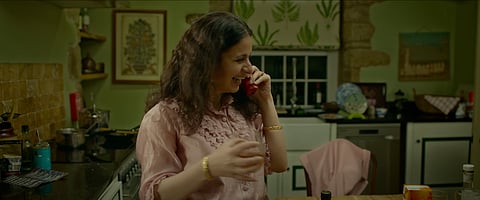Lord Curzon Ki Haveli is directed by Anshuman Jha.
It stars Rasika Dugal, Paresh Pahuja, Arjun Mathur and Zoha Rahman in lead roles.
Neither the mystery nor the heavy-handed postcolonial critique of immigration policies holds this film together.
Lord Curzon Ki Haveli Review | When Play Of Imagination Gets Sabotaged By A Choppy Script
In Lord Curzon Ki Haveli, the imaginative import lies in Rasika Dugal’s performance of Ira. As her instinct reigns supreme, repressed desire finds release and rage overwhelms the body, Ira—a domesticated wife—violently vindicates her enslaved self.
Anshuman Jha’s Lord Curzon Ki Haveli begins with Basuki Nath (Paresh Pahuja) and Ira (Rasika Dugal), husband and wife, leaving London to visit her friend Sanya (Zoha Rahman), who resides on the outskirts of the city. Basuki is self-righteous and Ira craves intimacy. The film contrasts their relationship with Sanya and her partner Rohit (Arjun Mathur), who are at ease with each other and express their desire without restraint. After the couples meet, this difference is augmented. While Sanya and Rohit have sex upstairs, a bored Ira sits in the living room beside Basuki, who is perturbed by the thumping sounds emanating from an enormous trunk kept in front of them. This crate, allegedly, hides the body of Lord Curzon.

Neither the mystery of Lord Curzon’s death nor the heavy-handed postcolonial critique of immigration policies holds this film together. Perhaps, for either or both to have worked, the cinematic setting in England needed to be marked. Suppose budgetary constraints restricted access to the landscape or cityscape. In that case, close attention to material details such as architectural elements, furniture, paintings, decorative objects or collectibles from travels, and other paraphernalia of a regular English house, might have allowed the spectator to realise the impulse that drove Jha’s film forward. When the key ingredients of a dish are missing, the result is bound to taste as bland as a joke without a punchline. What we are primarily left with to make sense of a place is an accent, a grandfather clock, and a book.

One remembers Diya Annapurna Ghosh’s darkly comic short film Neighbourhood Ties (2017), in which the setting of London emerges distinctly within a few opening shots. In her small-scale student film, shot solely in a house, murder is not perceived as an act but an impulse. In Lord Curzon Ki Haveli too, the imaginative import lies in Dugal’s performance of Ira. As her instinct reigns supreme, repressed desire finds release and rage overwhelms the body, Ira—a domesticated wife—violently vindicates her enslaved self. That this liberation can only be ferociously spontaneous, requiring a woman’s complete and utter surrender to her psychic world, creates a beautiful and intimidating mood in contemporary cinema.
Such momentary tyranny of a woman is truly an act of imagination, a rejection of everything that patriarchy demands—care, submission, modesty, politeness, forgiveness, endurance, and above all, an incapacitated existence. But this rejection also goes beyond the egalitarian approach of most feminist thought and revels in anarchy, to the extent of even destroying the world and its systems rather than attempting to fix them—to be enchantingly anti-natalist. If Basuki holds the belief that human life is sacrosanct even as he continues to abuse his wife, Ira’s indifference to his philosophical claim is not argumentative in nature, but brutally eventful. Ira, one fantasises, would suspend reality and dance at the edge of imagination rather than agree to navigate the realm of injustice and oppression.
But Lord Curzon Ki Haveli cannot conjure a similar force of meaning or emotion in what it frames as its central conflict, between the East and the West, the coloniser and the colonised, the Brit and the immigrant.
